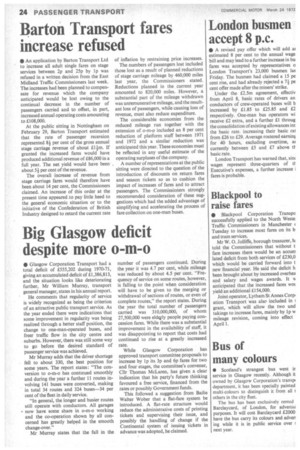Barton Transport fares increase refused
Page 26

If you've noticed an error in this article please click here to report it so we can fix it.
• An application by Barton Transport Ltd to increase all adult single fares on stage services between 2p and 25p by 1 p was refused in a written decision from the East Midland Traffic Commissioners last week. The increases had been planned to compensate for revenue which the company anticipated would be lost owing to the continual decrease in the number of passengers carried and to offset, in part, increased annual operating costs amounting to £108,000.
At the public sitting in Nottingham on February 29, Barton Transport estimated that the rate of passenger recession represented 8i per cent of the gross annual stage carriage revenue of about £11m. If granted the increased fares would have produced additional revenue of £86,000 in a full year. The net yield would have been about 51 per cent of the revenue.
The overall increase of revenue from stage carriage fares would therefore have been about 14 per cent, the Commissioners claimed. An increase of this order at the present time appeared to pay little heed to the general economic situation or to the initiative of the Confederation of British Industry designed to retard the current rate of inflation by restraining price increases.
The numbers of passengers lost included those lost as a result of planned reductions of stage carriage mileage by 460,000 miles last year, the Commissioners stated. Reductions planned in the current year• amounted to 820,000 miles. However, a substantial part of the mileage withdrawn was unremunerative mileage, and the resultant loss of passengers, while causing loss of revenue, must also reduce expenditure.
The considerable economies from the reduced mileage run together with the extension of o-m-p included an 8 per cent reduction of platform staff between 1971 and 1972 and a similar reduction was anticipated this year. These economies must be reflected in any useful estimate of the operating surpluses of the company.
A number of representations at the public sitting were directed to the question of the introduction of discounts on return fares and season tickets so as to cushion the impact of increases of fares and to attract passengers. The Commissioners strongly recommended consideration of these suggestions which had the added advantage of simplifying and accelerating the process of fare collection on one-man buses.




















































































































































